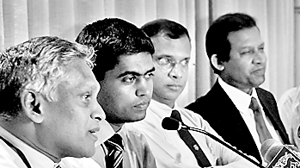“Organized care” as opposed to “disorganized care” has been urged in the immediate treatment of stroke patients in hospitals, for maximum benefit, not only to save lives but also to minimize permanent disability.
This should be the target of Sri Lanka, where strokes are the third leading cause of death, with a crisis looming on the horizon as the country faces an ageing population, said Prof. Saman Gunatilake, Consultant Neurologist, on Friday, on the eve of the first-ever International Stroke Conference.
The International Stroke Conference attended by both local and foreign experts was held at the Trans Asia in Colombo yesterday, as part of the Association of Sri Lankan Neurologists’ second Annual Scientific Session which will conclude today.
Pointing out that prevalence of stroke in Sri Lanka is estimated at 5 to 10 per 1,000 and is the leading cause of adult disability, Prof. Gunatilake, President-elect of the Association, told a media briefing that usually heart patients are placed right at the front in wards and stroke patients who have had a “brain attack” right at the end.
 |
| Picture shows the panel which addressed the media briefing on Friday: Health Ministry Secretary Dr. Athula Kahandaliyanage; Dr. Tissa Wijeratne, a Consultant Neurologist working in Australia; Consultant Rheumatologist and President of the National Stroke Association of Sri Lanka, Dr. Lalith Wijayaratne; Consultant Neurologist and President-elect of the Association of Sri Lankan Neurologists, Prof. Saman Gunatilake; President of the Association of British Neurologists Prof. Graham Venables; and Australian Stroke Society President Dr. Mandy Thrift. Pic by Sanka Vidanagama |
“This attitude among the health hierarchy and even doctors and people has to change,” he said.
With the “clot-buster treatment” being introduced in the country as a pilot study, giving more hope for victims who have suffered an ischaemic stroke, care under a multidisciplinary team in a stroke ward is vital, Prof. Gunatilake stressed. (An ischaemic stroke is caused by a blood clot which blocks an artery and prevents blood from entering a certain part of the brain and results in a brain infarction or death of vital cells.)
The clot-buster treatment which comes in the form of an injection given to disintegrate the clot -- after ensuring through a CT scan that it is an ischaemic stroke -- was introduced at the neuro-ward of the National Hospital, Colombo, 20 months ago, The Sunday Times understands. The treatment has to be given within the first three hours (the “golden window”).
This “foremost treatment” for ischaemic stroke which reduces the extent of disability of a victim had been introduced under pioneering initiatives of Consultant Neurologist Dr. Padma Gunaratne, President of the Association of Sri Lankan Neurologists.
Of 52 patients recruited for the pilot study, 10 had been administered the clot-buster treatment after evaluation of all factors. They benefited from the treatment and were less-dependent three months later, it is learnt.
Stressing the need for “organized care”, the President of the Association of British Neurologists Prof. Graham Venables said that funds were not needed to set up stroke wards, only a “systems change” within a hospital.
Rather than more resources, what was needed was reorganization of the available resources, with an area being demarcated for stroke victims where a stroke team could attend to them. “The outcomes are better and it is a win-win situation,” he said.
Giving terrifying statistics, the President of the National Stroke Association of Sri Lanka, Dr. Lalith Wijayaratne who is also a Consultant Rheumatologist, said one-third of stroke victims die, one-third recover fully but a huge one-third are permanently disabled.
“From the moment of diagnosis, it is important not only to treat but also begin rehabilitation,” said Dr. Wijayaratne.
Meanwhile, in a message sent to the sessions, the President of the Association of Sri Lankan Neurologists Dr. Padma Gunaratne said, “The burden of stroke is unarguably a national issue and should be addressed by the Government of Sri Lanka. Nevertheless, the contributions that could be made for the benefit of stroke victims and for primary prevention by NGOs such as the National Stroke Association of Sri Lanka are noteworthy. The Association, in existence for the last 10 years, has conducted education programmes for carers of stroke victims and also for primary and secondary prevention.” (KH)
National policy on non-communicable diseases
A National Policy to combat non-communicable diseases (NCDs) has already been drawn up and will soon be submitted for Cabinet approval, followed by a National Plan, assured Health Ministry Secretary Dr. Athula Kahandaliyanage.
The tackling of NCDs would cover all -- hypertension, diabetes, cancer, heart disease and stroke, he said, explaining that the National Policy has been drawn up taking into account the views of all stakeholders, not only the health sector.
Commending professionals for acting as champions and initiating action, Dr. Kahandaliyanage cited the example of the National Stroke Association of Sri Lanka.
Agreeing that stroke wards will not cost much, the Secretary said that circulars had already been sent to State hospital directors to make available facilities for stroke patients within the resources available.
In addition to the stroke ward at the National Hospital and the newly-established ward at the Kurunegala Teaching Hospital, a model stroke unit has been set up at the Kegalle Teaching Hospital recently. Plans are also underway for such a unit in Nuwara Eliya, it is learnt.
With proof from around the world that stroke wards not only save lives but also help survivors become more independent, this would be the right path for Sri Lanka to take.
| 